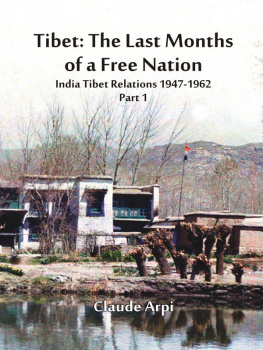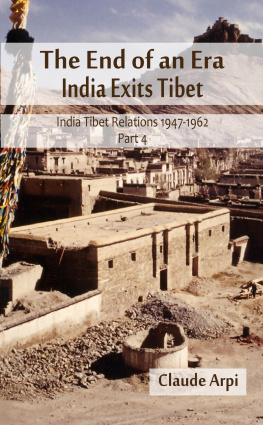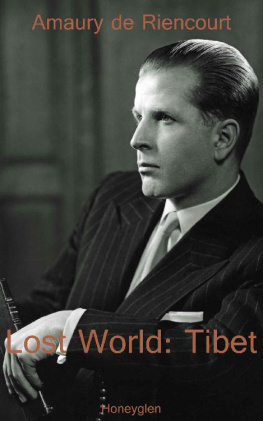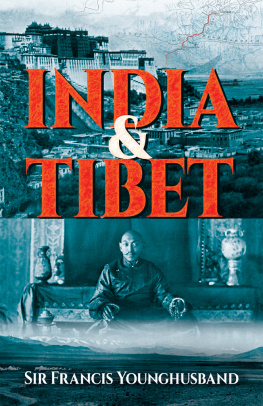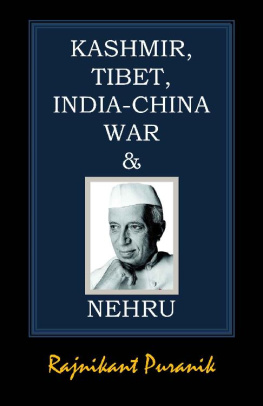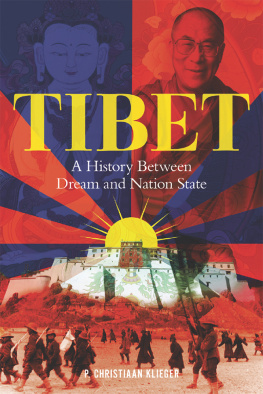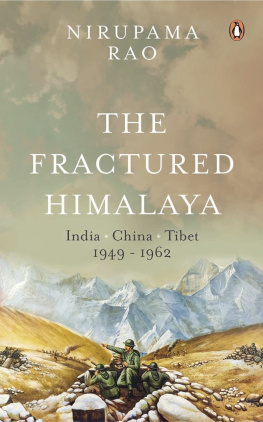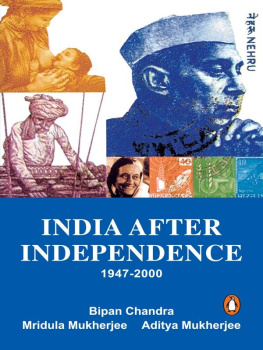Tibet: The Last Months of a Free Nation
India Tibet Relations (1947-1962)
Part 1
Tibet: The Last Months of a Free Nation
India Tibet Relations (1947-1962)
Part 1
Claude Arpi
United Service Institution of India
New Delhi
Vij Books India Pvt Ltd
New Delhi (India)
Published by
Vij Books India Pvt Ltd
(Publishers, Distributors & Importers)
2/19, Ansari Road
Delhi 110 002
Phones: 91-11-43596460, 91-11-47340674
Fax: 91-11-47340674
e-mail:
Copyright 2017, United Service Institution of India, New Delhi
ISBN : 978-93-86457-21-9 (Hardback)
ISBN : 978-93-86457-24-0 (Hardback)
ISBN : 978-93-86457-20-2 (ebook)
All rights reserved.
No part of this book may be reproduced, stored in a retrieval system, transmitted or utilised in any form or by any means, electronic, mechanical, photocopying, recording or otherwise, without the prior permission of the copyright owner. Application for such permission should be addressed to the publisher.
There are moments when the Spirit moves among men and the breath of the Lord is abroad upon the waters of our being; there are others when it retires and men are left to act in the strength or the weakness of their own egoism. The first are periods when even a little effort produces great results and changes destiny; the second are spaces of time when much labour goes to the making of a little result. It is true that the latter may prepare the former, may be the little smoke of sacrifice going up to heaven which calls down the rain of Gods bounty.
Unhappy is the man or the nation which, when the divine moment arrives, is found sleeping or unprepared to use it, because the lamp has not been kept trimmed for the welcome and the ears are sealed to the call. But thrice woe to them who are strong and ready, yet waste the force or misuse the moment; for them is irreparable loss or a great destruction.
Sri Aurobindo, The Hour of God
F irst of all, I would like to thank Prof Mahesh Rangarajan. Without his help this book would have never been possible. He encouraged me to seek permission to access the JN Collection and always pushed my case. I must say that I was doubtful that in this life I would see the Nehru Papers, but with a little bit perseverance and his support, it worked.
I take this opportunity to thank the staff of the Nehru Memorial Museum & Library and particularly Ms Jyoti and her colleagues of the Manuscript Section. They have not only always been patient with me but greatly helped to provide me volumes after volumes of the Collection.
The present Director, Shri Shakti Sinha has also been kind.
I am deeply indebted to the United Service Institution of India (USI) for offering me the Field Marshal KM Cariappa Chair of Excellence for this research on The relations between India and Tibet between 1947 and 1962. I am particularly grateful to Lt Gen PK Singh, PVSM, AVSM (Retd), the Director of USI, who trusted that something interesting could come out of my study. I hope that I did not disappoint him.
My thanks too to Maj Gen BK Sharma, AVSM, SM** (Retd), the Deputy Director (Research) and Head of the CS3, under which this research is conducted. I would like also to mention Dr Roshan Khaniejo, who is coordinating my research for the USI.
Maj Gen PK Goswami, VSM (Retd), Deputy Director (Adm) at the USI has always made the administrative matters smooth, for this I am grateful.
I am truly indebted to Maj Gen PJS Sandhu (Retd), who has recently retired as Deputy Director and Editor of the USI Journal; he has been my guide for this work; he shares with me a great love for history. It has always been (and it will remain) a pleasure to discuss strategic issues with such a scholar and gentleman.
My gratitude to my publishers, Brig PK Vij and his son, Rohan. They have been patient with many of my last minutes changes. I appreciate.
I have to thank Abha, my wife for her constant support and allowing me to disappear to Delhi from time to time. Moreover she has looked into the manuscript and made a number of sharp comments and great suggestions, which I readily followed.
My daughter Smiti too kept wondering why I had to go to Delhi so often to see old papers. She has been supportive and understanding.
I wish that my father-in-law Maj Gen KK Tewari had read through the manuscript, but unfortunately, he left us just as the final draft was completed. He suffered enough in his PoW camp in Tibet in 1962/63 to understand the issues related in this study.
Thank you to Yuvraj Saharan, Abha, Deepti, Smiti and Aurevan for proof-reading and Nirmala for typing hundreds of the cables, telegrams and reports.
And finally, I want to thank God Almighty (or my Good Fortune) for giving me the opportunity to do something I love to do.
I t is deeply irritating to read the history of the Indian sub-continent based on the British, American, Russian or Chinese primary sources. It is particularly annoying when the documents come from CIA sources, which end up proving that the CIA did everything.
One cannot blame the historians who use these sources as it is today practically impossible to access the Indian Archives.
Due to an antediluvian mindset, no declassification system has been put in place since Independence. It is not that the declassification process is not governed by a Law. A legislation exists: all documents older than 25 years need to be declassified, unless there is a serious security angle to prevent it.
The Public Record Rules, 1997, state that records that are 25 years old or more must be preserved in the National Archives of India (NAI) and that no records can be destroyed without being recorded or reviewed. Legally, it is mandatory for each ministry or department to prepare a half-yearly report on reviewing and weeding of records and submit it to the NAI. The rules also stipulate that no public records which are more than 25 years old can be kept classified or destroyed by any agency unless it is properly appraised. Unfortunately, this is not done in a proper manner.
As often in India, the Law does not apply to the Government which is above these human contingencies.
The fact remains that this practice is not healthy and often documents end up getting lost in the ministries. Moreover, in most cases, it is not in Indias national interests to keep these old files closed.
Very few in India realise the extent to which history has been confiscated.
The refusal of the Government to release the Henderson-Brooks-Bhagat Report on the 1962 Sino-Indian War is one well-known case.
I could also cite the Gangtok Papers relating to the Political Officer (PO) who overviewed the Indian relations with Tibet, Sikkim, Bhutan and NEFA from Claude White, the first PO (1903), till the merger of Sikkim in 1975. These papers, though sent from Gangtok to Delhi under CRPF escort in 1976, are said to be lost; it is a fact that no government official is today able to say where the priceless files have gone.
By a stroke of luck (or good karma), last year I was given the permission to go through the Jawaharlal Nehru Collection, also known as the Nehru Papers at the Nehru Memorial Museum Library. Though the collection only contains what passed through the first Prime Ministers Office, I was nevertheless able to decently reconstruct what happened to Tibet during the Fateful Year (1950).

